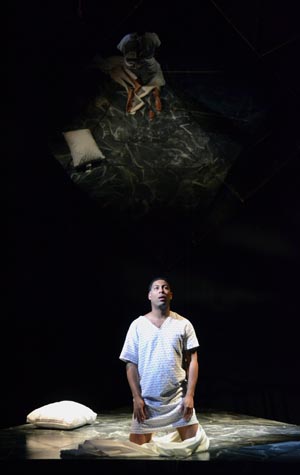Eötvös’s “Angels in America” receives ambitious staging at BU
When angels fly, they do so gloriously, and when they fall, they fall hard. Both were evident at the Boston University Theatre in Thursday night’s performance of Peter Eötvös’s Angels in America, an operatic adaptation of Tony Kushner’s play about the AIDS epidemic. The production, mounted by Boston University’s College of Fine Arts and drawing its cast and crew largely in-house or from affiliates, was an admirable execution of Eötvös’s opera. The opera itself, which was composed between 2002 and 2004, sometimes brilliantly translated drama into music, and other times simply crashed.
In Eötvös’s opera, Kushner’s play, a two-part seven-hour marathon, gets a two-hour treatment. Three story lines intersect: drug-addicted Harper, a Mormon, suspects (rightly) that her husband, Joe, may be more interested in men than women; Roy Cohn, Joe’s employer and a bigoted big-shot lawyer, is secretly dying of AIDS while haunted by the ghost of Ethel Rosenberg; and Prior Walter, a young man recently diagnosed with AIDS, is abandoned by his lover, Louis, just when times get tough. Things get even more complicated when Prior begins to have visions of an angel who claims that Prior is a prophet.
Despite the complicated plot, which furthermore involves doubled parts, dreams, and hallucinations, Eötvös effortlessly lays out the exposition and development. It is here, in the first act, that he gets nearly everything right. One imagines, even, that the play would have paled in comparison.
Indeed, Kushner’s play is eminently operatic: sudden exits and entrances abound, mad scenes are around every corner, and an atmosphere of anxious unease just begs to be translated into music. Eötvös conveys that unease by clothing his vocal lines in veils of moody, shifting sounds—angular horns, wandering strings, the odd pluck of guitar. The palette is squarely atonal.
Eötvös also makes clever use of an onstage quintet, most memorably in depicting Harper’s drug-induced paranoia. Eötvös inverts the traditional mad scene, where singing is an external manifestation of insanity, by bringing that insanity onto the stage, surrounding Harper with an actual chorus of demonic hisses and murmurs. Smartly, Eötvös stays true to speech patterns in his writing for the principals, and avoids needlessly fussing with lines that are mostly half-spoken, half-sung, punctuated with impassioned outbursts. The eponymous angels are another fantastic musical realization. Here, a full-throated soprano (specifically, that of Arielle Basile) convincingly depicts divinity incarnate.
But despite using the same musical language in the second half of the opera, Eötvös seems to lose the thread after intermission. After setting up three story lines, Eötvös devotes himself to the weakest one. Roy Cohn lamely dies, and one wonders why he was in the opera in the first place. Joe moves in with Louis, and Harper, presumably, remains insane forever. Prior, meanwhile, visits heaven, which is a rainy place abandoned by God, and passionately convinces the angels that he wants to stay on earth, no matter how terrible life seems. Eötvös may have found this absorbing and life-affirming, but the result here is directionless and rather sentimental.
Boston University assembled a compelling cast for Eötvös’s opera, and found the right voices for the two vocally most important roles of the Angel and Prior Walter. As per Eötvös’s directive, all performers used amplification. This improved speech clarity and allowed for otherwise inaudible vocal effects, but made it difficult to judge how well a voice filled a hall and led to some jarring unevenness in amplitude.
Nevertheless, Arielle Basile’s purity of tone and breath control in the role of the Angel were apparent, as was as her command of the role’s dizzying tessitura. Benjamin C. Taylor provided a robust, impassioned baritone for the role of Prior Walter. Jesse Darden’s sweet, beguiling tenor was perfect for the role of Louis, Prior’s inconstant lover. Kaitlin Bertenshaw, who displayed her acting chops by convincing as both Harper and Ethel Rosenberg, brought an ample, though slightly edgy, mezzo-soprano to her roles.
Bass-baritone Jorgeandrés Camargo brought an interesting animal vitality to the dastardly Roy Cohn. Bryan Pollock’s hammed-up Belize was striking, but a bit one-dimensional, and his otherwise fine countertenor sounded uncomfortable negotiating between speech and singing. Kylee Slee was at ease with the florid writing, and colored her mezzo-soprano to persuade in her role as an aged rabbi. In the pit, William Lumpkin was a sympathetic conductor, always in time with his singers, and conjuring a delicate balance between the sounds and silences of Eötvös’s score.
Peter Eötvös’s Angels in America contonues through Sunday. http://www.bostontheatrescene.com/season/angels-in-america-opera/
Posted in Performances





